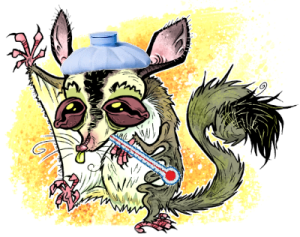
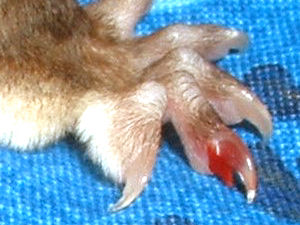
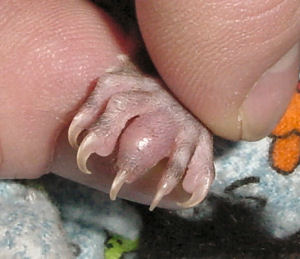
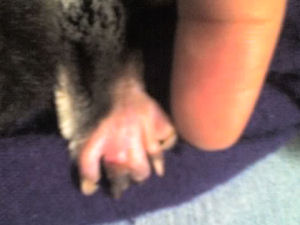
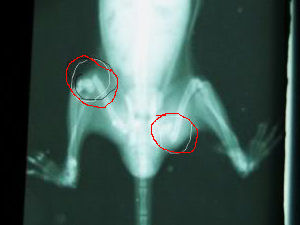
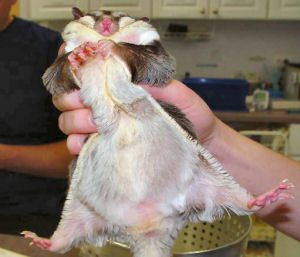
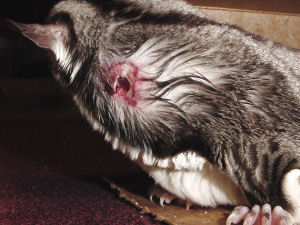

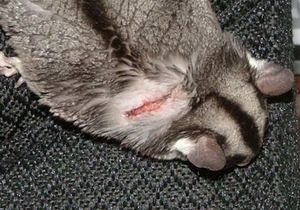
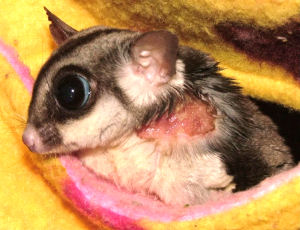
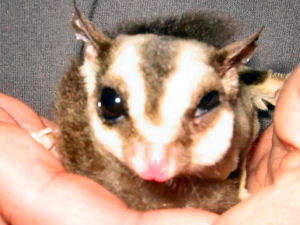
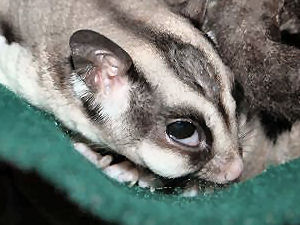
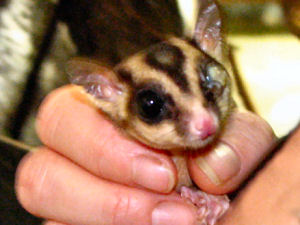
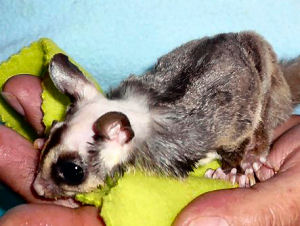
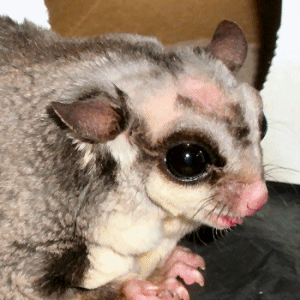
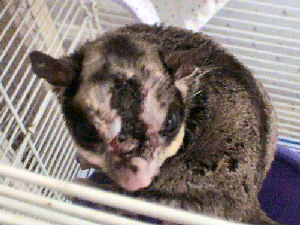
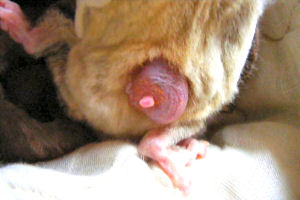
My Sugar Glider Is Sick!
I never thought it would happen to me, but it did. My sugar glider got sick and I was barely prepared to handle the problem even after ten years of owning sugar gliders. Because of my own experience, I thought it wise to share what I learned in order to help you be ready for some of the things that may very well happen to YOU.
These images you see are just a few examples of things that can happen to your pet. Sugar gliders are not the easy to keep animal that so many people claim they are. It is common for any of these maladies listed below to happen to YOUR pet even when kept and cared for properly. As a sugar glider owner, you absolutely must be aware of the various health issues that your animal faces and be prepared to prevent when possible and respond when needed.
Proper keeping helps to minimize many possible health issues, but some can happen regardless.
A simple unmanaged nail caught in a pouch can painfully rip the nail from the flesh and get infected or become necrotic, or it can also allow the animal to break and mangle its fingers or limb which can lead to possibly chewing it off to get free. This happens. Sugar gliders are smart little critters but they are not smart enough to calm themselves to figure out the best way to get free, they simply freak out and yank, yank, yank and bite, bite, bite.
There are actually a lot of dietary issues including obesity, malnutrition and hypocalcemia.
A simple bite from another animal in the cage can turn into a hole, an open wound, stretched skin, infection and eventually death. An average person might think that a simple bite to the skin would scab up and heal but it doesnt. One of the many things that an owner must know about their sugar glider is that they fixate on things. An open wound is an invitation to clean it. If the animal can reach it on its own, it will do so and will end up making the issue much worse than it would be when left alone. If the animal cannot reach it, others in the cage will jump at the chance to continually clean it, and in doing so will stretch and rip and remove the skin thusly making the wound much more severe and life threatening. The first step in addressing any wound is to remove the animal from a group cage and also use an e-collar if necessary to prevent self mutilation. An open wound means a month or more of solitary confinement so the owner must have extra cages and supplies available for this possibility. The same holds true even for wounds closed by a vet. Glue and stitches are foreign to the animal and will immediately be ripped out making the wound even worse than original. The owner must find a way to keep the animal and others in the cage from grooming the area until it can heal closed with no scabs.
Overgrooming is when the animal presents with a stereotypy in the form of endlessly grooming itself in a specific area which wears that area down to the skin or possibly much worse including self mutilation. This behavior often arises from mental stress created from improper keeping. A small cage, loneliness, poor diet, lack of exercize are all things that must be addressed. Often adding an exercise wheel, ongoing mental stimulus, larger cage or a cage friend will resolve or prevent these kinds of issues.
A tail is very fragile, and once it has been bitten, it has also been broken. It will begin to dry up and will need a surgical amputation to prevent infection and death. Very rarely can a tail be repaired.
A bump under the eye is most likely a dental abscess which if left alone can burst and cause necrotic tissue and death. The eye may often have to be removed..
THE LIST GOES ON
The possible health issues are expansive. Here are some items to become familiar with:Unmanaged nails get caught and ripped off
Toes swollen, bitten, infected, broken
Mating or fighting wound
Puncture wounds on patagium
Tail biting, chewing, amputation
Dental abscess
Eye scratch, penetration, ulcer, infection
Ear bites
Hind leg paralysis
Malnutrition and dietary issues
Overweight
Overgrooming and other mental/stress issues
Self Mutilation
Accidents around the house
Other household animal/pet attacks
Urinary tract infection
Oral tumors
Mastitis
Giardia
Parasites
Inverted or swollen pouch
Prolapsed cloaca, genitals, bladder
Teeth trimming, Wing clipping
Please learn as much as you can about this animal before jumping into ownership and be ready to prevent and also respond when necessary. Sugar gliders will need vet attention in their lives for one reason or another so you must be able to provide that. If you see signs of any of the maladies presented here, please go see a vet immediately.
These items listed above are brief and only a few of the many things a sugar glider owner must know to be successful. This post is designed to start you on the quest for learning. You are welcome to visit the Sugar Glider Encyclopedia and come read through, search and join in any of the forum discussions. And the sugar glider chatroom is often busy in the evenings for real-time interaction with other owners.
You are welcome to come discuss this article to add/modify some of the content or simply leave a comment.
Please read my other two introductory articles: Christmas Sugar Glider , Sugar Glider Cages
Life is full of questions, never be afraid to ask any of them. Please never stop learning and always share what you learn with others.
Responses:
I just wanted to say thank you for for your post. Many people don't realize what can go wrong with gliders, they also don't realize they are not good pets for kids or alot of people really. They require ALOT of care and work. - Christy
Thanks so much for posting this. I adopted a glider from craigslist and he came in a horrible tiny $15 bird cage. -Taylor
What an excellent post! Thank you for being so caring and putting this together in one place! I have 6 girls. 4 are in the Oriental Tall and the other two in the Brisbane. Everybody has plenty of room! Kudos to you!!! Whomever you are!!! -Evelyn
Thanks for that. I often see glider sellers on CL who are unable to write a simple declarative sentence, free of spelling and grammatical errors. Seems to me that these folks do not possess the knowledge and skill needed to care for such a fragile animal. -Dr R Hamilton
Thanks for the info. I always wanted a sugar glider, but after reading this, i think i will leave to someone better able to care for them. -Rebecca
Thank you for the craigslist post about cages!! We are considering gliders, but have a lot to learn! -Gabrielle
Hello, I just wanted to say "thank you" for your craigslist post on improper sugar glider care. I own two gliders myself and it was actually painful to see some of the conditions that other people were forcing their gliders to live in. Hopefully your post will educate current owners and make potential new owners more conscious of the time and work involved in keeping gliders happy and healthy. again thank you -Christine
Hi, we have just recently found out about sugar gliders. I do not think that we are going to get any though because believe it or not we did think of some of the things that you mentioned. I think it is awesome that you took the time to hopefully make people think about how they cage any animal. I hope people really do their research so that all animals are cared for properly. Thank you -Cheryl
Who are you? You are my damn hero! rofl!!!!
I love your post. Do you mind if I print it out and hand out to people who purchase sugar gliders from me? I just had someone return a pair after 2 weeks because they didn't have time.
Even after telling them what type of cage was inappropriate, they purchased one that is on your list. It is a piece of garbage and already falling apart. -Dawn
I don't know who you are but I appreciate your post so much on Craigslist! I have seen some horrible conditions that people try to claim are ok for their gliders! I have 4 myself and the smallest cage I have is 5' tall. Hopefully this will try and deter people from buying one on a whim and not knowing what they are getting themselves into. -Jennifer
I have been researching sugar gliders and their care for awhile, and have been considering adding some to my family soon. There is varied and contradictory information all over the web ... and it helps to have concise and scientific resources for those of us considering this important commitment!! Thanks for your post!! -Trish
I just wanted to say thank you for for your post. Many people don't realize what can go wrong with gliders, they also don't realize they are not good pets for kids or alot of people really. They require ALOT of care and work. - Christy
Thanks so much for posting this. I adopted a glider from craigslist and he came in a horrible tiny $15 bird cage. -Taylor
What an excellent post! Thank you for being so caring and putting this together in one place! I have 6 girls. 4 are in the Oriental Tall and the other two in the Brisbane. Everybody has plenty of room! Kudos to you!!! Whomever you are!!! -Evelyn
Thanks for that. I often see glider sellers on CL who are unable to write a simple declarative sentence, free of spelling and grammatical errors. Seems to me that these folks do not possess the knowledge and skill needed to care for such a fragile animal. -Dr R Hamilton
Thanks for the info. I always wanted a sugar glider, but after reading this, i think i will leave to someone better able to care for them. -Rebecca
Thank you for the craigslist post about cages!! We are considering gliders, but have a lot to learn! -Gabrielle
Hello, I just wanted to say "thank you" for your craigslist post on improper sugar glider care. I own two gliders myself and it was actually painful to see some of the conditions that other people were forcing their gliders to live in. Hopefully your post will educate current owners and make potential new owners more conscious of the time and work involved in keeping gliders happy and healthy. again thank you -Christine
Hi, we have just recently found out about sugar gliders. I do not think that we are going to get any though because believe it or not we did think of some of the things that you mentioned. I think it is awesome that you took the time to hopefully make people think about how they cage any animal. I hope people really do their research so that all animals are cared for properly. Thank you -Cheryl
Who are you? You are my damn hero! rofl!!!!
I love your post. Do you mind if I print it out and hand out to people who purchase sugar gliders from me? I just had someone return a pair after 2 weeks because they didn't have time.
Even after telling them what type of cage was inappropriate, they purchased one that is on your list. It is a piece of garbage and already falling apart. -Dawn
I don't know who you are but I appreciate your post so much on Craigslist! I have seen some horrible conditions that people try to claim are ok for their gliders! I have 4 myself and the smallest cage I have is 5' tall. Hopefully this will try and deter people from buying one on a whim and not knowing what they are getting themselves into. -Jennifer
I have been researching sugar gliders and their care for awhile, and have been considering adding some to my family soon. There is varied and contradictory information all over the web ... and it helps to have concise and scientific resources for those of us considering this important commitment!! Thanks for your post!! -Trish